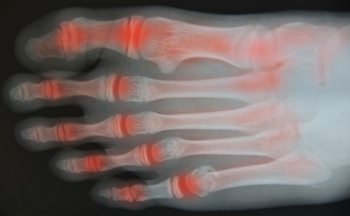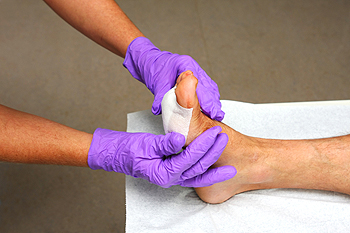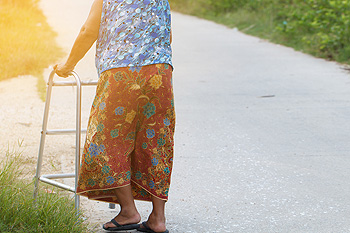
 If you are experiencing chronic pain, which may be caused by inflammation in your feet, you may have rheumatoid arthritis. This uncomfortable ailment is caused by an autoimmune condition and will typically affect the tissues in the feet, which may cause severe pain and swelling. When this condition develops in the feet, the joints in the ankle may become affected as a result of possible damage that the tissues and ligaments may endure. This may cause diminished support in the ankle bones and can cause difficulty in walking. If rheumatoid arthritis (RA) develops in the center of the foot, damage to the ligaments may cause the arch to gradually collapse, and desired relief may be felt by wearing shoe inserts. If you are experiencing this type of foot pain, it’s suggested to consult with a podiatrist, so the proper treatment techniques can begin.
If you are experiencing chronic pain, which may be caused by inflammation in your feet, you may have rheumatoid arthritis. This uncomfortable ailment is caused by an autoimmune condition and will typically affect the tissues in the feet, which may cause severe pain and swelling. When this condition develops in the feet, the joints in the ankle may become affected as a result of possible damage that the tissues and ligaments may endure. This may cause diminished support in the ankle bones and can cause difficulty in walking. If rheumatoid arthritis (RA) develops in the center of the foot, damage to the ligaments may cause the arch to gradually collapse, and desired relief may be felt by wearing shoe inserts. If you are experiencing this type of foot pain, it’s suggested to consult with a podiatrist, so the proper treatment techniques can begin.
Because RA affects more than just your joints, including the joints in your feet and ankles, it is important to seek early diagnosis from your podiatrist if you feel like the pain in your feet might be caused by RA. For more information, contact Dr. Alan J. Spector of Shore Podiatry. Our doctor will assist you with all of your podiatric concerns.
What Is Rheumatoid Arthritis?
Rheumatoid Arthritis (RA) is an autoimmune disorder in which the body’s own immune system attacks the membranes surrounding the joints. Inflammation of the lining and eventually the destruction of the joint’s cartilage and bone occur, causing severe pain and immobility.
Rheumatoid Arthritis of the Feet
Although RA usually attacks multiple bones and joints throughout the entire body, almost 90 percent of cases result in pain in the foot or ankle area.
Symptoms
Diagnosis
Quick diagnosis of RA in the feet is important so that the podiatrist can treat the area effectively. Your doctor will ask you about your medical history, occupation, and lifestyle to determine the origin of the condition. Rheumatoid Factor tests help to determine if someone is affected by the disease.
If you have any questions please feel free to contact our office located in Point Pleasant, NJ . We offer the newest diagnostic and treatment technologies for all your foot and ankle needs.
 If you are afflicted with diabetes, you may have foot conditions that have developed as a result of this ailment. The body’s ability to heal any sores, cuts, or wounds that form on the feet may diminish when diabetes is present. Additionally, many diabetic patients experience a form of neuropathy, which reduces the ability to feel sensations in the feet. This may block the feeling of any pain that may be present from open wounds, and is often accompanied by a sensation of tingling or “pins and needles”. Research has shown there are several ways to control this condition, including monitoring blood pressure and cholesterol levels, implementing healthy lifestyle changes, and incorporating a gentle exercise routine into your daily activities. If you are diabetic, it is strongly suggested to consult with a podiatrist on a regular basis for proper examinations of your feet, in addition to monitoring any open wounds, which may aid in preventing infections from occurring.
If you are afflicted with diabetes, you may have foot conditions that have developed as a result of this ailment. The body’s ability to heal any sores, cuts, or wounds that form on the feet may diminish when diabetes is present. Additionally, many diabetic patients experience a form of neuropathy, which reduces the ability to feel sensations in the feet. This may block the feeling of any pain that may be present from open wounds, and is often accompanied by a sensation of tingling or “pins and needles”. Research has shown there are several ways to control this condition, including monitoring blood pressure and cholesterol levels, implementing healthy lifestyle changes, and incorporating a gentle exercise routine into your daily activities. If you are diabetic, it is strongly suggested to consult with a podiatrist on a regular basis for proper examinations of your feet, in addition to monitoring any open wounds, which may aid in preventing infections from occurring.
Diabetic foot care is important in preventing foot ailments such as ulcers. If you are suffering from diabetes or have any other concerns about your feet, contact Dr. Alan J. Spector from Shore Podiatry. Our doctor can provide the care you need to keep you pain-free and on your feet.
Diabetic Foot Care
Diabetes affects millions of people every year. The condition can damage blood vessels in many parts of the body, especially the feet. Because of this, taking care of your feet is essential if you have diabetes, and having a podiatrist help monitor your foot health is highly recommended.
The Importance of Caring for Your Feet
Patients with diabetes should have their doctor monitor their blood levels, as blood sugar levels play such a huge role in diabetic care. Monitoring these levels on a regular basis is highly advised.
It is always best to inform your healthcare professional of any concerns you may have regarding your feet, especially for diabetic patients. Early treatment and routine foot examinations are keys to maintaining proper health, especially because severe complications can arise if proper treatment is not applied.
If you have any questions please feel free to contact our office located in Point Pleasant, NJ . We offer the newest diagnostic and treatment technologies for all your foot and ankle needs.
 Research has shown that people who are sixty five or older may have an increased risk in falling. As a result, many people have incurred serious injuries. There have been recent studies which cite that when patients partake in a regular exercise program, the chances of falling may decrease. Specific exercises may be introduced to include resistance and strength training, which may increase overall body strength, yoga, which may aid in improving flexibility, and tai chi, which may help to maintain proper balance. Additionally, there have been studies performed that include taking vitamin D supplements for the prevention of falling. However, after much consideration, it has been found that taking this particular supplement has little or no correlation with reducing the risk of falling unless there are medical conditions involved that may include osteoporosis or a vitamin D deficiency.
Research has shown that people who are sixty five or older may have an increased risk in falling. As a result, many people have incurred serious injuries. There have been recent studies which cite that when patients partake in a regular exercise program, the chances of falling may decrease. Specific exercises may be introduced to include resistance and strength training, which may increase overall body strength, yoga, which may aid in improving flexibility, and tai chi, which may help to maintain proper balance. Additionally, there have been studies performed that include taking vitamin D supplements for the prevention of falling. However, after much consideration, it has been found that taking this particular supplement has little or no correlation with reducing the risk of falling unless there are medical conditions involved that may include osteoporosis or a vitamin D deficiency.
Preventing falls among the elderly is very important. If you are older and have fallen or fear that you are prone to falling, consult with Dr. Alan J. Spector from Shore Podiatry. Our doctor will assess your condition and provide you with quality advice and care.
Every 11 seconds, an elderly American is being treated in an emergency room for a fall related injury. Falls are the leading cause of head and hip injuries for those 65 and older. Due to decreases in strength, balance, senses, and lack of awareness, elderly persons are very susceptible to falling. Thankfully, there are a number of things older persons can do to prevent falls.
How to Prevent Falls
Some effective methods that older persons can do to prevent falls include:
Falling can be a traumatic and embarrassing experience for elderly persons; this can make them less willing to leave the house, and less willing to talk to someone about their fears of falling. Doing such things, however, will increase the likelihood of tripping or losing one’s balance. Knowing the causes of falling and how to prevent them is the best way to mitigate the risk of serious injury.
If you have any questions, please feel free to contact our office located in Point Pleasant, NJ . We offer the newest diagnostic and treatment technologies for all your foot care needs.